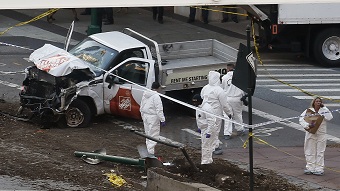New guidance designed to prevent commercial vehicles, including vans, lorries, buses, coaches and even cranes, from being used as weapons in acts of terrorism has been published by the BSI and the UK’s Department of Transport. The standard, which has been published by the British Standards Institution (BSI) and sponsored by the Department for Transport, sets out a number of security measures to prevent criminals and terrorists from accessing commercial vehicles.
To meet the new requirements, operators must:
• Improve their knowledge of potential risks and determine which of those risks apply to their business
• Develop a security management plan
• Assess risk exposure
• Put in place management and accountability for security
Other requirements will include checks of drivers’ references and previous employment history and also regular visual checks of vehicles for signs of tampering. To ensure the new standard is met, the Government is working with the industry to develop accreditation and certification schemes for commercial vehicle firms, with further details to be announced in due course.
The BSI explains organisations should use this standard because:
• It reduces the likelihood that vehicles you operate will be used for malicious purposes, saving you cost, time and disruption as well as potential damage to your organization, it’s function, assets, personnel and reputation
• It deters and contributes to the prevention of other vehicle crime
• It contributes to mitigating the terrorist threat from commercially operated road vehicles
• It can be tailored to operations of any size and lets you implement it in a proportionate way
• It covers the security of personnel as well as the physical security of sites and vehicles and security management planning and processes
• This is the only standard tackling this kind of vehicle crime head on
Attacks on the public involving vehicles, which have been targeted due to their size and potential impact, have had tragic consequences in recent years, including in the Westminster and London Bridge attacks of 2017. This announcement aims to create barriers to carrying out these types of attacks and also aims to assist the fight against serious and organised crime, including helping to minimise the risk of drug and people smuggling.
Transport Minister Robert Courts said: “This is vital new guidance which will go a long way to help us in our fight against terrorism and organised crime. I wholeheartedly support this move and the British Standards Institution in their important work. “Terror attacks and organised crime involving commercial vehicles have had tragic and devastating effects in recent years, with every life lost leaving an unimaginable void in the lives of so many.
“This government will continue to work tirelessly to ensure the British public are kept safe.”
Nick Fleming, Head of Mobility and Transport Standards at BSI, said: “This new standard, developed with operators of commercial vehicles, encourages good practice in the managing of security risks that may help to reduce the threat of vehicles being used in acts that may cause intentional harm to the public or for organised crime. “The standard highlights the growing importance of physical vehicle security measures to help prevent such criminal acts taking place.”
The new standard has been developed by transport, safety and crime experts, and is targeted at operators of light and heavy goods vehicles, as well as those of public service vehicles and mobile plants, such as cranes and tip trucks.








